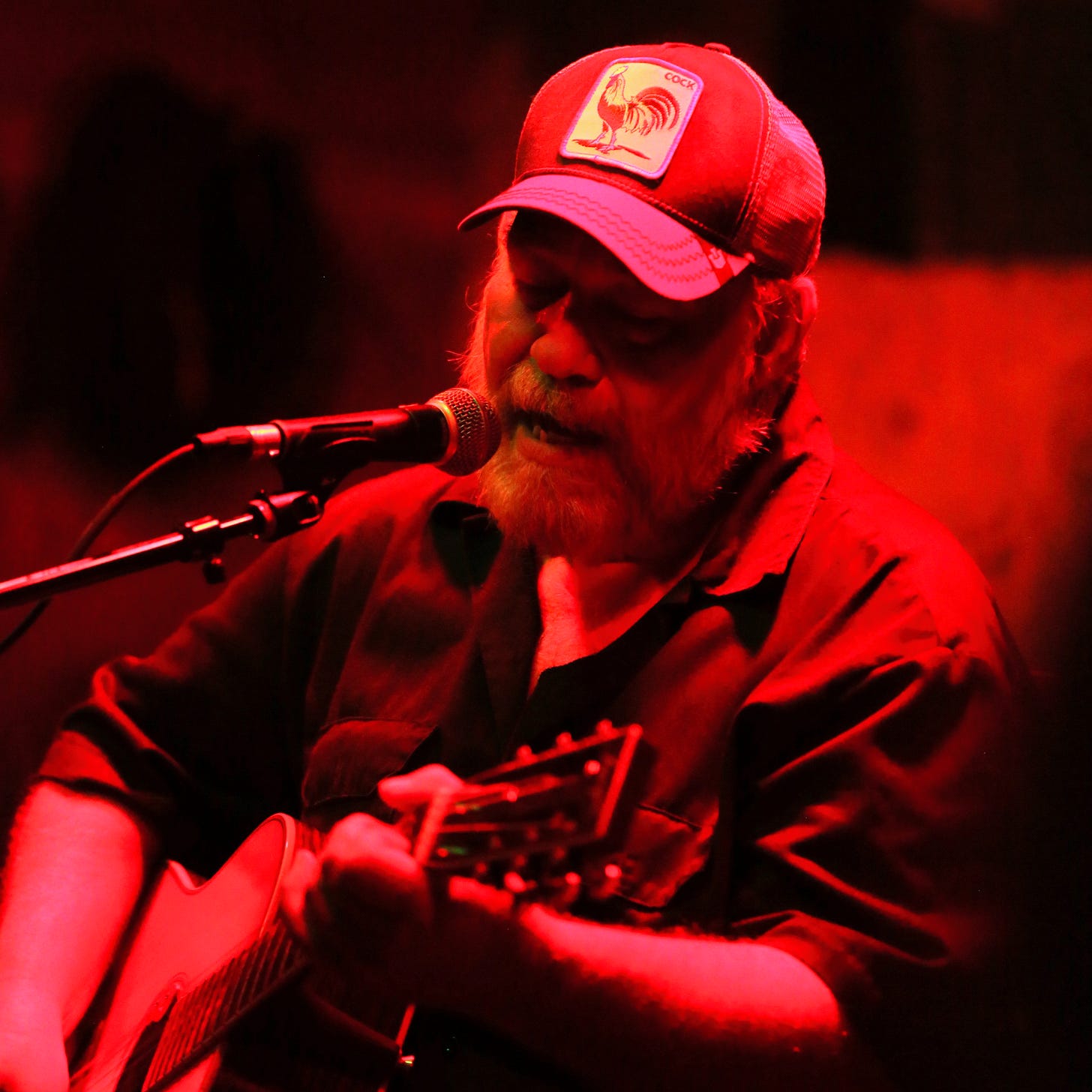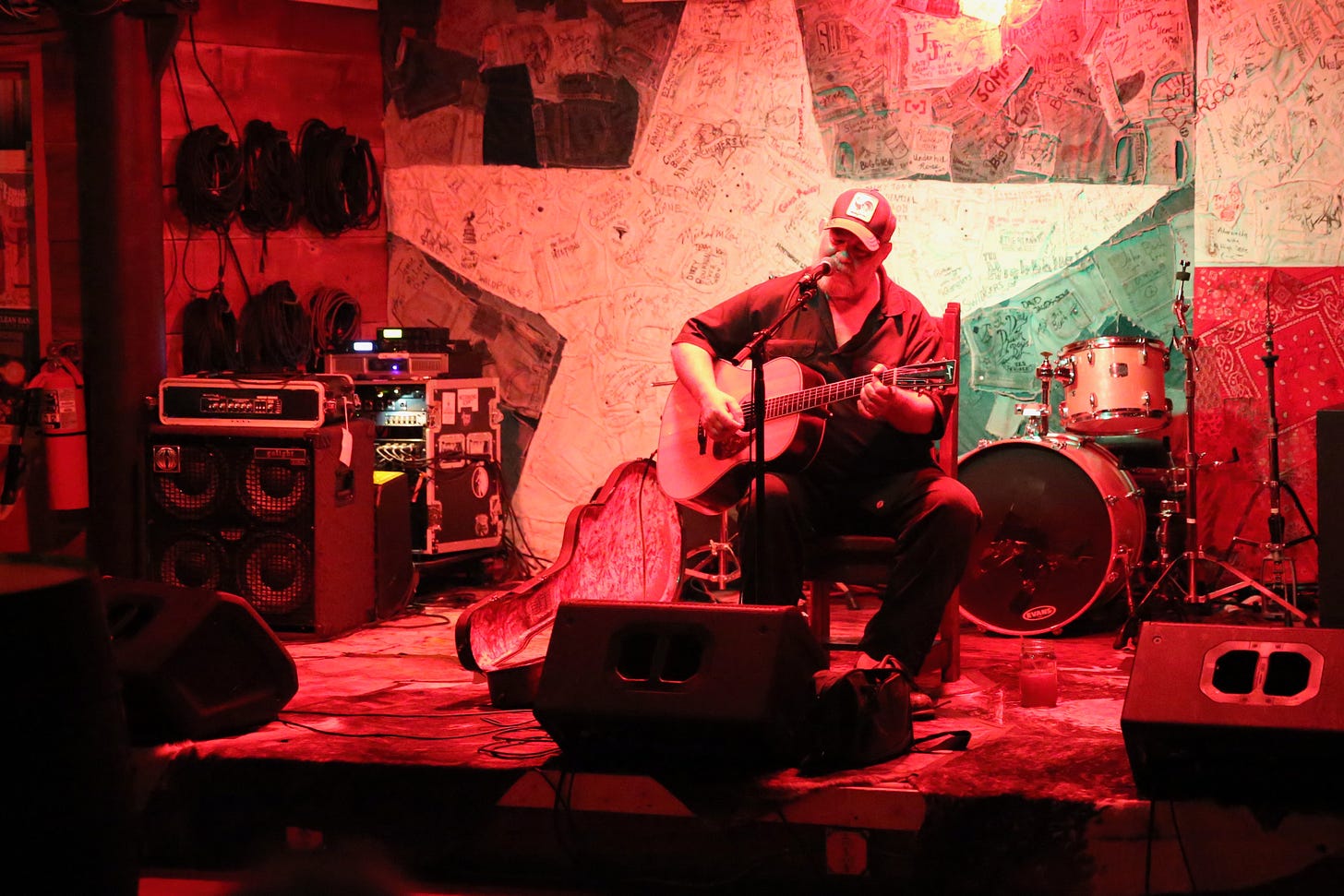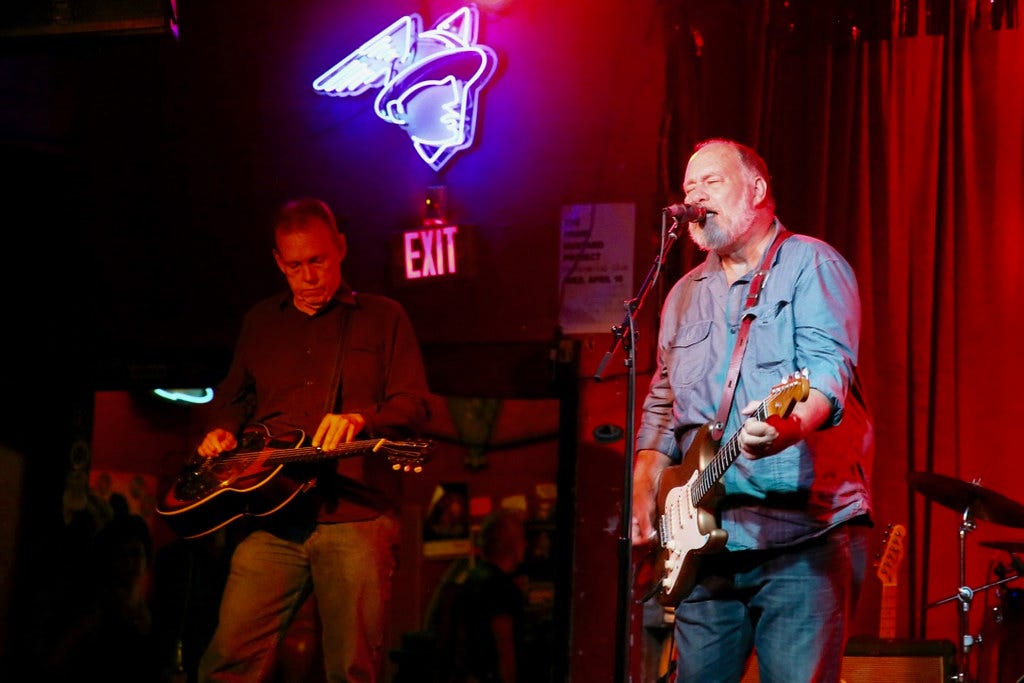Conversations: Jon Dee Graham
Austin musician talks about songwriting, life on the road, and the definition of faith
Three years ago, as his 60th birthday approached, I was fortunate to interview Jon Dee Graham about life in the music business. At the time, the Austin-based singer-songwriter — he’s in the city’s Music Hall of Fame as a solo act and as a guitarist/vocalist with two groups — was working to raise money to make a new album.
Like many musicians I enjoy, Graham does not draw huge crowds (their loss) and his fans are ones who come to listen and experience the music. But without fail, Graham provides the same quality show and songcraft whether he’s playing for 15, 50, 150, 500, or 1,000, solo acoustic, or with his band the Fighting Cocks. That’s the mark of a true pro, and something others would do well to heed.
Still, Graham is nothing if not a realist. “Acclaim doesn’t put food on the table,” he said during the 45-minute interview. “It’s adorable and I’m touched, but I cannot possibly be more tired of the phrase ‘Best songwriter you’ve never heard of.’”
Graham has self-funded every album he’s recorded since 2012’s “Garage Sale,” selling music and watercolors of bears out of his car when he tours. Immunocompromised because he’s been without a spleen since a near fatal car accident, he had a heart attack in July 2018 and has sparingly performed during the pandemic.
Now, as he says, his wife (aka “The Professor”) has given him clearance to return to the road.
In light of that and the self-funded album — you can still make a donation here — I recently went back to look at our 2019 interview. What surprised me was Graham’s level of candor and honesty with a near-total stranger, our conversations previously limited to a few post-concert conversations and several interactions on social media.
But then, when you listen to his songs, what else can you expect?
Here are edited highlights from our conversation. All quotes are Graham’s:
Life as a Working Musician
“I have to leave Austin to make money basically. Truly I do. I’ve never played a club that does not want me back. That seems like a small measure but in our business that’s what it’s really about. The audience doesn’t owe me anything. It’s my job to convince them that they need to hear what I have to say.”
Self-Funding His Music
“I invented crowd funding. ‘Garage Sale’ was done completely on pre-orders. That was the same year Kickstarter launched, and they didn’t have a platform in place that was functional until after I did that album. Now I’ve been doing it on my own for so long that I don’t know there’s any other way.
“I make a record, put it in my car and drive around playing and selling it to people. We’ve done alright by it. We’ve never missed a meal and almost own our house, so it works. It works really well.”
The New Album
“Potentially this will be my last record. I hope not but what if it is? At my age and the crowd I ran with, let’s just say they were enthusiastic about living (laughs) and a lot of them are not with me anymore. If this turns out to be the last record, I want it to be right.
“I’m carefully conscious that I’m not making a death record. My approach is, ‘Let’s say this is your last, what do you want it to accomplish?’”
On Songwriting
Graham is famous for austerity in his writing. In a lengthy 2013 essay for the Bitter Southerner, editor Chuck Reece marveled at how Graham’s “$100 Bill” has only 28 words. That led us into a discussion about his songwriting process.
“What I learned pretty early on was the stuff that moved me was simple. Not in the sense of the obvious but in the sense that the fewer moving parts a machine has, the less likely it is to break or to do something that’s not its job. … There’s so much to be said for letting the listener’s imagination do what it’s there for.
“I had a writing teacher during my brief tenure at (the University of Texas) who told me, ‘Words are under no obligations to you.’ That is so true because I can write these very simple lines that mean what I want them to mean. Then three different people can listen to it, be deeply moved and it means something completely different to each of them.
“I wish I could say this is how I write my songs, but I can’t because they come at me all different ways. Some of them arrive fully conceived and take about as long to write them as to sing them. Some are like feral cats. You leave a bowl of milk out on the porch and coax them in. Gradually you get to pet them and eventually they come indoors. … Sometimes if I try and write a song before I’m ready or before I can see it clearly enough to catch it, I’ll scare it off.
“My process is I say a prayer and pick up a guitar and a legal pad and see what happens. But that being said, I’m a harsh critic. I’m hard to please. I don’t put a word on the paper unless I believe it. If you go through my notebooks that I use to work on songs, there are not a lot of different versions. There’ll be some aborted versions, and there will be versions that are slightly different, but I know in my heart when I hear the right line. That sounds corny but it’s true. In order for me to write something down I have to believe it’s going to work.”
Superstitions and Faith(less)
At this point, Graham and I talked about how thoughts are at times so quick to disappear, and why capturing a thought is so important, no matter when it occurs. That led into a discussion on superstitions, religion, faith and one of his two best loved songs — “Faithless.”
“Let’s be square about this here. Who knows where this stuff comes from? It is a superstitious process. If I have one of those feelings, what I want to capture is that certain feeling. If I don’t sit down and start to write it, it can leave the tracks and I can’t get it back.
“Faithless — I’ve played it in a couple of churches as well as at a couple of funerals. People get confused with the terms spirituality and religion. Religion is for people who are afraid to go to hell. Spirituality is for people who’ve been to hell.
“Literally the definition of faith is the belief in things unseen. If you can’t muster that up you’re going to have a hard time in this world. It does not have to be the belief in the white robe bearded God. It can be whatever but you can’t live in this world and not realize that something is going on, that something happening that is not you and is not me.
“My friend Hal is an astrophysicist. He said to me once, ‘If I gave you a box with all the molecules you needed you still could not build a tree.’ In that sense you’d be a fool not to have faith of some sort. So much of what happens in our lives and what goes into our lives is necessarily unseen. When they smash atoms in the collider, you don’t actually see the electron, you just see the passing of the electron. With love, friendship, fidelity, loyalty, you don’t see it, you just see it pass through your life. That’s why we need faith.”
The Music Business Today
Graham’s youngest son, William, is a singer-songwriter who often performs with his dad at the Continental Club. The apple, as they say…
“He’s an amazing, amazing songwriter. He’s the real thing. I feel so bad for him because there’s no infrastructure anymore in music. At least I got in on the tail end. As the empire was crumbling, I still got to walk through the streets of Rome, and it’s helped me in my career to at least have gotten that initial push. If I was starting out again, if I were in William’s shoes right now, I don’t know what I’d really do.
“There used to be artist development. Record labels really didn’t expect to make their money back for the first three records because artists were encouraged and allowed to grow? Who on earth would give Tom Waits a record deal today, or for that matter, Neil Young? These were artists who were nurtured and allowed to move forward in ways that are just actually impossible now. Even if someone wanted to do it, they couldn’t.
“I don’t think I’d still be doing this if what I was doing wasn’t up to par, and I think with William it will work the same way. But the old paradigm is dead and no one knows what the new one is yet. How is any musician supposed to make money, other than touring, when you can pay a subscription fee to Amazon Prime and get any song for free?
“I’m not one of those people who is bitter about it, or pines for the old days. There were a lot of problems with the major labels. Every friend I know who had a major label deal has a horror story to tell. It’s to varying degrees, but they all have horror stories.
“What I do miss is that music used to mean more to people. I find it hard to believe that it doesn’t still. How many times do you hear a song on the radio and go back instantly to where you were when you heard the song the first time. There’s so much value in that. I just don’t think people feel the same way anymore. … Music has become very disposable.”
Wrapping It Up…
At the end of the conversation, Graham tells a funny yet profane story. He refers again to his friend Hal, the astrophysicist.
“One of my favorite stories he’s told me pretty much sums up what we’re talking about here. He said with the best observatories we had that astrophysicists came up with pretty clear mathematical layouts and descriptions of how things worked in the universe.
“Hal said, ‘Then we set the Hubble (telescope) up and we all looked at each other and went, ‘Fuck. We were wrong.’ So we set up a new lens and a new mirror and lens so we could see further. And then we said, ‘Fuck. We were wrong again.’
At this point, Graham laughs.
“So the further you see, the more you realize how wrong you were. It made me realize, ‘Well, hold on Frances, take a few steps back. You don’t know everything yet.’ I’m still teachable after all these years.”






I'm glad I came across this via your interview with John Doe. Great work, Glenn. JDG is a treasure and one of the few people I admire that I've never gotten to see live just because of scheduling flukes (I was playing the same night, etc.).